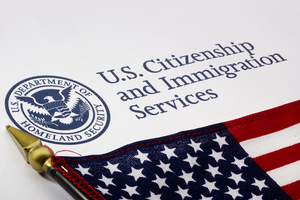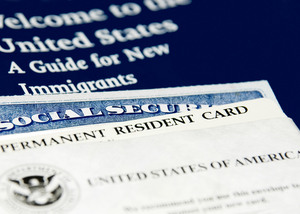There is nothing more disappointing than getting a student visa rejected after lots of hardwork and finally receiving admission to a college or university in the United States.
Every type of visa has some eligibility criteria created by immigration that one must meet to receive a visa. A student visa can be denied at the consulate any time a student is unable to prove that they can and will comply with the visa program’s purpose and requirements. Below are some common reasons why a student visa may be denied.

Top Examples of Visa Denial
1. No intention of returning to your home country
If the visa officer thinks that you do not have any intention of returning to your home country after you finish your studies in the United States, your student visa may be rejected. To avoid this you can prove that you have strong roots in your home country such as family ties, businesses, future job plans, or property.
2. Inadequate financial means
The visa officer needs to make sure that you have enough money to pay for your education and living expenses while studying in the United States. If your financial documents fail to convince them of your financial means this is a reason for denial you need to have liquid assets immediately available for use such as cash in the bank. You aren’t expected to show enough to cover your entire program, but you must show for at least the first academic year.
3. Lying to the officer
Giving false or incorrect information to the visa officer is the last thing you want to do during a student visa interview. If you are caught not only will your student visa be denied, but you can also received a fraud charge and be permanently barred from the United States.
4. Bad conduct at the visa interview
Arriving late for your visa interview does not look good. Also you should dress well and come across as self-assured and well-mannered. If you come across too nervous it could get you into trouble, and the visa officer can deny you your student visa for bad conduct at the interview.
5. Unexceptional academic credentials and lack of knowledge
You will need to demonstrate your credibility as a good student for obtaining a student visa, for example showing that you indeed obtained a prior degree with good grades, which would have been necessary for your admission to the program you plan to study in. Mediocre or bad grades and RFE scores can be a reason to deny to a student visa.
6. Bad English language skills
Your English skills need to be reasonably good to obtain your student visa in most cases. You need to prove that you can study in English at an American university or college if that program of study is in English.
7. Applying after program start date
Your student visa can be denied if you apply for it after the program start date on your I-20 or DS-2019 form. Your visa can also be denied if the start date has not passed yet, but the officer believes that you will not enter the United States until after the date has passed. It is important to plan ahead and schedule your visa interview as early as possible.
8. Failure to pass security check
All nonimmigrant visa applicants are required to undergo a security check. If your name is tagged in the Consular Lookout and Security System, you can be denied a student visa.
9. Inadmissibility charges
If you have been charged with inadmissibility to the United States, your visa will be denied. Charges for inadmissibility are things such as criminal convictions and time in the United States without legal status for more than 180 days.
10. Don’t bring all of required documents to the interview
You must bring the following documents with you to your interview:
• a valid passport
• a Nonimmigrant Visa Application, Form DS-160
• an application fee payment receipt
• a passport photo
• a Certificate of Eligibility for Nonimmigrant (F-1) Student Status (Form 1-20)
If you do not bring these documents with to the interview, your student visa will most likely be denied.
If your student visa is denied, the consular officer should tell you the reasons both verbally and in writing. Depending on the reasons, you may be able to reapply for your visa once you have the required documentation to overcome the denial.



 Es muy importante saber los derechos y obligaciones que una persona USC tiene en un País extranjero, en este caso nos enfocaremos a los derechos que se tiene en México en caso de ser
Es muy importante saber los derechos y obligaciones que una persona USC tiene en un País extranjero, en este caso nos enfocaremos a los derechos que se tiene en México en caso de ser  There are several ways to
There are several ways to  There are different ways of working in the United States legally, how? Through a work visa! The U.S. government over the time has authorized work visas (for temporary jobs, professional jobs, exchange visitor, etc.) for foreigners; each one has different requirements and benefits, certain visas can lead to the U.S. residency by working with an U.S. employer. It is possible to get one of these work visas, even if you have negative
There are different ways of working in the United States legally, how? Through a work visa! The U.S. government over the time has authorized work visas (for temporary jobs, professional jobs, exchange visitor, etc.) for foreigners; each one has different requirements and benefits, certain visas can lead to the U.S. residency by working with an U.S. employer. It is possible to get one of these work visas, even if you have negative  If you have a relative that is
If you have a relative that is  In the United States,
In the United States,  There are many cases in which for reasons of distance, love, or simply it is no longer possible to legally preserve the marriage between spouses. Sometimes it is the best to dissolve the marriage bond that unite you to a person, and especially if that person is in another country where you are!
There are many cases in which for reasons of distance, love, or simply it is no longer possible to legally preserve the marriage between spouses. Sometimes it is the best to dissolve the marriage bond that unite you to a person, and especially if that person is in another country where you are! Existen muchos casos donde por diversas cuestiones emigras de tu País de origen, y pasa y pasa el tiempo y haces una vida en el extranjero, en muchos de estos casos, desafortunadamente no cuentas con documentos legales que acrediten tu estancia migratoria legal, y esto te pone entre la espada y la pared, ya que a lo largo del tiempo generas lazos familiares y económicos en tu nuevo lugar de residencia y se te dificultaría mucho el regresar a tu País de origen con la posibilidad de no poder regresar nuevamente y perder todo lo que has cosechado a lo largo del tiempo.
Existen muchos casos donde por diversas cuestiones emigras de tu País de origen, y pasa y pasa el tiempo y haces una vida en el extranjero, en muchos de estos casos, desafortunadamente no cuentas con documentos legales que acrediten tu estancia migratoria legal, y esto te pone entre la espada y la pared, ya que a lo largo del tiempo generas lazos familiares y económicos en tu nuevo lugar de residencia y se te dificultaría mucho el regresar a tu País de origen con la posibilidad de no poder regresar nuevamente y perder todo lo que has cosechado a lo largo del tiempo. There are different legal pathways to become a US resident: through work, investment, or even for having been a victim of a crime; but the most common, easy and quick method (depending on the degree of family relationship) is through a relative that is US resident or citizen (USC). This is a right that the US resident or citizen has under US law to file a petition for an alien with the
There are different legal pathways to become a US resident: through work, investment, or even for having been a victim of a crime; but the most common, easy and quick method (depending on the degree of family relationship) is through a relative that is US resident or citizen (USC). This is a right that the US resident or citizen has under US law to file a petition for an alien with the  Si tienes algún familiar residente y/o
Si tienes algún familiar residente y/o 
